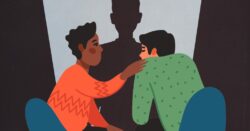How to support a friend if they have an abusive partner (Credit: Getty)
With one in four women becoming a victim of domestic abuse, it’s important to look out for signs in our friends’ relationships as well as our own, and provide the right support.
Society’s setup has long allowed us to turn a blind eye when things get awkward or uncomfortable, particularly when it comes to other people’s relationships. We’ve always been told that the arguments and problems that happen between couples outside of our own relationships have nothing to do with us.
But when those situations start to look questionable and concerning, perhaps even abusive, it’s important to step in.
According to Refuge UK, one in four women will experience domestic abuse in her lifetime, and Mankind UK adds that one in six men will experience it too. In the UK, the police receive a call for help relating to domestic abuse every 30 seconds.
With statistics as harrowing as these, it’s important that we look for the signs in our own relationships, but also that of our friends.
When we do spot the signs of abuse, it can be difficult to raise the alarm – especially when it’s on behalf of someone else who we love. But spokespeople from domestic violence charities Women’s Aid and Refuge have provided their advice.
Sarah Davidge, head of research and evaluation at Women’s Aid, says there are particular signs that show a friend might have an abusive partner. She notes that women in particular often have to hide abuse for their own safety, so you won’t always be able to recognise when someone is being abused. There are, however, some signs to watch out for:
Is your friend’s partner controlling her access to money or stopping them from working? Does he emotionally manipulate them? Is he verbally abusive, humiliating her in front of others? Does your friend change their actions or behaviour because they think their partner will be angry? For example, going home early from social occasions or dressing more conservatively?Is your friend’s partner jealous and controlling of their movements? This isn’t romantic, or normal, it’s abusive. Have they become isolated from friends or family? Does their partner tell them that they’ve imagined things, and have them doubting their own sanity? This is gaslighting and abuse. Is there any physical and/or sexual violence happening? These are always wrong.
There are a lot of early red flags you can look out for in a partner’s relationship and it’s important to keep an eye on them if you do spot any.
Davidge says that if something doesn’t feel right in a relationship, then it probably isn’t.
‘Coercive control is a pattern of behaviour used by perpetrators to instil fear and restrict freedom and it underpins all domestic abuse,’ Davidge explains. ‘If your friend’s partner starts to isolate them from friends and family, regularly insults them, controls their actions, clothes or finances, or makes you feel worthless or afraid- these are all red flags which indicate abuse.’
It’s important to remember that domestic abuse is not always physical. Emotional and psychological abuse can also have devastating, life-long impacts.
This is happening to my friend. How do I tell her?
Abigail Ampofo, Director of Service Delivery at Refuge, tells Metro.co.uk: ‘The first thing to remember is that if you see or hear an assault, or you are worried your friend might be in an emergency situation, you can call the police on 999.
‘If you witness a friend being abused, your first instinct may be to protect them, but intervening directly can be dangerous for you and your friend.’
If you have spotted any of the signs of domestic abuse, reaching out to your friend is the first step, if it is safe to do so. Tell them that you believe them, and it is not their fault.
‘To start a conversation with a friend you are concerned is being abused, you can be inquisitive about their wellbeing,’ Ampofo explains. ‘Simply asking “you haven’t seemed yourself lately. Is there anything you want to talk about? Is everything OK at home?” could help open a conversation about their concerns or fears.’
She adds that the most important thing to do is to create a safe space away from the abuser for your friend to speak with you – one where they won’t be judged or dismissed, and can feel able to open up.
‘Making sure to speak to your friend on their own and at a time where the abuser cannot hear or involve themselves is important to keep both you and the possible victim safe.‘
What if my friend doesn’t leave?
Ampofo explains that, while it may seem logical to you that they leave, a survivor will have a lot of barriers to ending a relationship with an abusive partner.
‘It can take time to leave someone who controls and intimidates you,’ she says. ‘Leaving an abusive partner is a process; women often attempt to leave several times before making the final break.’
Davidge adds that you should listen, believe and don’t judge if they don’t act straight away. ‘It’s important that your friend knows you’re there for them. Don’t expect them to act on your advice immediately, and don’t judge her if they don’t leave the relationship. Just be there for her as a friend.’
A lot of the time, people with abusive partners find ways to justify their partner’s actions and don’t recognise an abusive partner for what they are. If this is the case for your friend, you can try telling them that none of this is their fault, nothing justifies abuse, and that there is help out there.
‘Give her time to talk and don’t tell her to leave if they aren’t ready – that’s her decision to make,’ Davidge adds.
Davidge explains that there are many reasons women don’t leave an abusive partner. One of the most important reasons is that leaving doesn’t automatically make the abuse stop: the abuse often continues or even escalates, so leaving can be incredibly dangerous.
‘Support your friend by trying to understand the reasons that they stay in the relationship. They may still love him and the idea of being without him may be difficult for her, especially if the abuse has affected her confidence. Your friend may also believe that their abusive partner will change,’ Davidge adds.
‘Remember, you can’t force your friend to come to terms with the abuse. When they feel ready to reach out for support or to think about leaving, it’s important that they make the decision for themselves and are not pushed into it. Take care of yourself too, as this isn’t an easy situation for you either,’ she says.
Ampofo adds that leaving can be the most dangerous time for a survivor of abuse. ‘It is important your friend seeks specialist support if she is planning to leave. Our National Domestic Abuse Helpline advisors and specialist services, as well as other specialist services around the country can help survivors to plan for their safety both in and out of a relationship. It is better for the woman to contact the Helpline directly. You can empower her by explaining who we are and what it’s like to call us.’
‘There is more information about what it is like to call the helpline on our helpline website: www.nationaldahelpline.org.uk.’
If a friend keeps saying they want to leave the relationship, but they don’t, what do I do?
Davidge explains that this is also quite common, and it’s important not to judge your friend or try to force them to leave. Instead, tell them that you understand the barriers they are facing and that you’re there for them regardless of what they do.
They may want to leave, but they knows it isn’t safe to. Her abuser may be emotionally manipulating her, so they feel they can’t cope on her own if they leave.’
This could also take some of the pressure off you, as your friend would then have external help and support and someone else to talk to. Remember that you can’t change the situation for her and that you must also look after yourself.
If they do leave the relationship, how can I support them afterwards?
A big change has taken place and your friend may feel lonely and isolated at first. ‘It’s very important to support and believe your friend if they choose to leave an abusive partner,’ Ampofo says.
‘Domestic abuse has long term impacts and the trauma of experiencing abuse can stay with survivors’ years after they have fled their abuser. You will need to be supportive and patient with them, listening to them and respecting their journey,’ she adds.
Davidge notes that friends may even say miss their relationship and doubt her decision to leave at times. ‘In this situation, tell her this is normal. Tell her to treat herself gently and not to rush the healing process,’ she says.
‘Remind your friend that they’ve taken a huge, courageous step in leaving the relationship, and they should give themselves credit for that.’
One of the most important things to remember in supporting a friend with an abusive partner, is that their self-esteem is likely to decline. The job of the friend is to lift her up, perhaps by spending time together doing things they enjoy, and remind them who they are, and that they are much stronger than they think.
How to help
If you are in immediate danger, call 999 and ask for the police.
For free, confidential advice, 24 hours a day contact a domestic abuse helpline.
Look after your own wellbeing too. Hearing or thinking a friend is being abused could be upsetting. Agencies including the National Domestic Abuse Helpline can also provide advice and guidance to friends or family who are worried about someone they care about. Please visit www.nationaldahelpline.org.uk for more information.
Do you have a story to share?
Get in touch by emailing [email protected].
MORE : Domestic abuse and sexual assault victims to be better protected under new law
MORE : My family didn’t believe I was a domestic abuse victim because I’m a man
MORE : When does jealousy in a relationship become a red flag? Signs to watch out for
How can you help?





